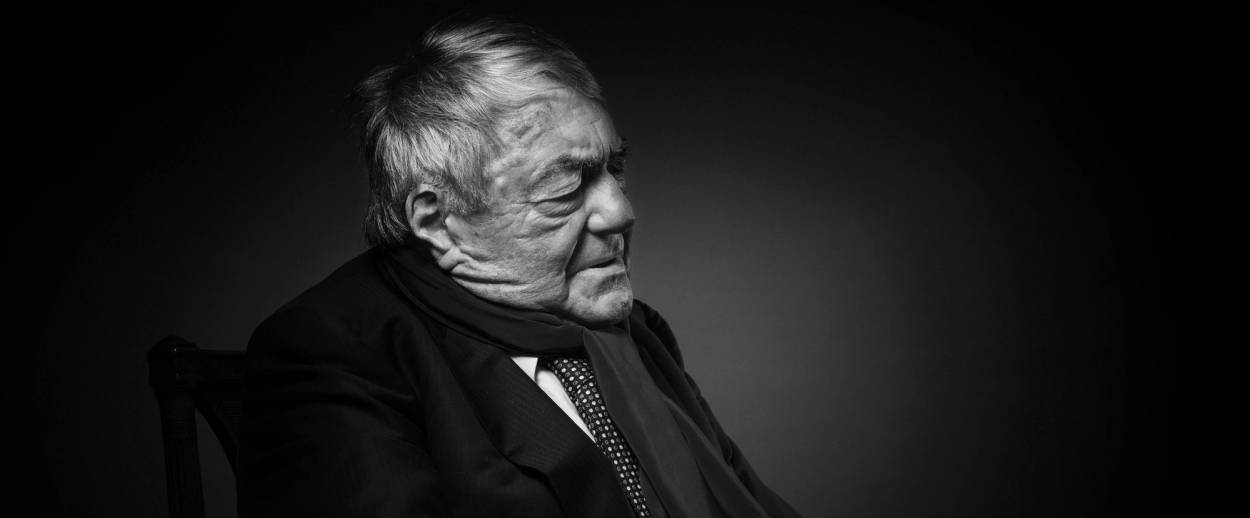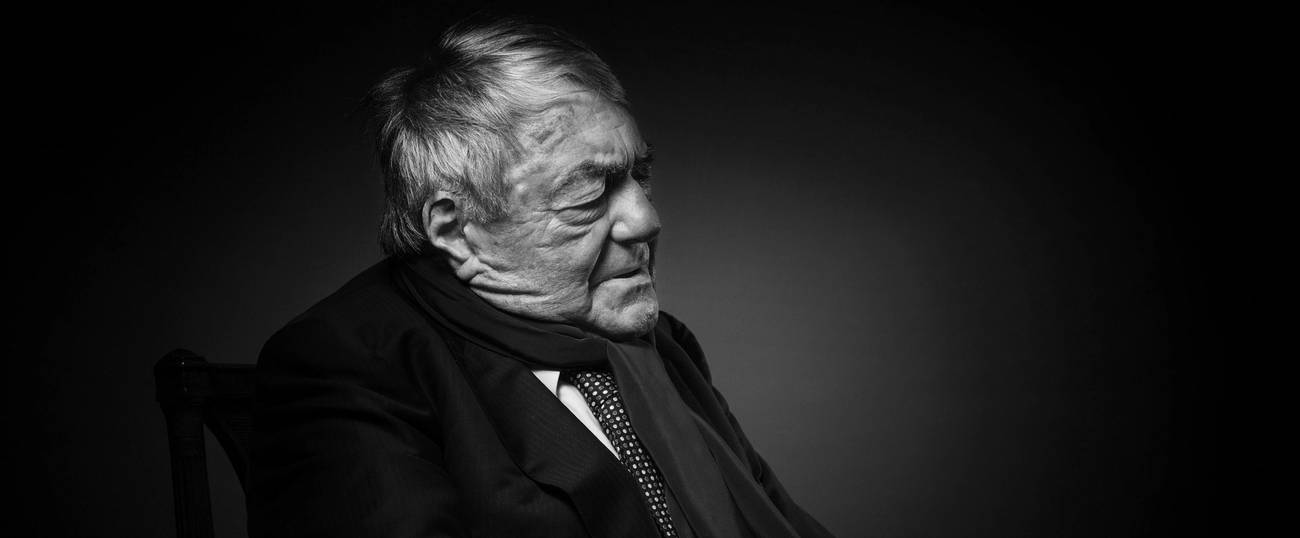Farewell to Claude Lanzmann
Like Orpheus, Lanzmann was an untamed poet for whom the verses were steel rails, birch forests, silences, names




This address was delivered today by French philosopher Bernard-Henri Lévy at the memorial service for filmmaker, author, and Resistance hero Claude Lanzmann at the Hôtel des Invalides in Paris.
Mr. Prime Minister, Ministers, Parliamentary dignitaries, The Mayor of Paris, Dear friends,
“And I have, twice victorious, crossed Acheron…” There are few men in the world for whom this verse of nineteenth century French poet and author Gérard de Nerval applies to more appropriately than Claude Lanzmann. If there is one man, among the survivors, who truly made the voyage to purgatory, it is he, the author of Shoah. If there is an Orpheus who took the extreme risk to go, without looking back, and not once, not twice, but time and time again, seeking his Eurydice in the countless faces, it is this man of fury and of piety left to retrieve, in the dust of the crematoriums, this holy remnant: the six million names that the Nazis wished to dissolve in one single bout of steam. Like Orpheus, Lanzmann was a poet. He was an untamed poet for whom the verses were steel rails, birch forests, silences, names. But he was a poet. And this was, in the eyes of the women and men who loved him, angered him, loved him still but, always, admired him, his foremost and eminent greatness.
There are other filmmakers, of course, who have been poets. But they had been straightaway, on well plotted paths, like Dante following Virgil or of Virgil proceeding Homer. Claude–this was one of the wonders of his magnificent life–became this Dante, or this Homer, after an earthly period in which he lived, as the great converts, lingering for a long while, very long, on the side lines of this minor art that is, often, journalism. So, what happened in order for the skilled portraitist, the talented columnist, the Leibnizian friend of the last philosopher of the twentieth century, Jean-Paul Sartre, to take the divine plunge into the black waters of the absolute crime? What requisition was necessary for the young lover of the great Dame of feminism, Simone de Beauvoir, to find the force in this unprecedented astonishing and exhausting stand-off with Evil and the Oblivion? And what voice inspired this Rancé, to consecrate the entire second part of his life to tirelessly seek and scour the archipelagos of the extermination camps? This is the enigma for which he did not give the key and that to my knowledge, no one has veritably lessened the incomprehensibility. We must believe, in the absence of anything better, that he had been drawn in by the abyss, and, deep down, was called.
Another genius of Claude Lanzmann was to go, into the places which were the most explosively antagonistic for that, thundering his love of the everlasting Eurydice which was for him, on the other side of the dead, the resuscitated Jewish people. Consider that this ardent defender of the Jewish State never lamented his combative support to Algeria’s independence movement which did not take long to join its youthful voice to the rising vociferation against the survivors of the Exodus. Consider that this admirer of David Ben Gurion and of Menachem Begin remained, until the end, a Franz Fanon type for whom the work, and he knew it well, never ceased to provide ammunition to most furious of Israel’s enemies. And remember the embarrassment of some of his anti-colonialist and progressive friends when they saw emerge this other film, Tsahal, where he showed: firstly that, if there was, in the 20th century, the birth of a nation faithful to the promises of its liberation, it was Israel; and secondly, that the battalions of this war, its valiant knights trained at the academies, not of Masada, but of Gideon, King David, Abraham the triumphant victor of the five kings or Samson who, bound, with blind eyes, managed to find the force to implode the walls of a temple upon the heads of the Philistines, was not an army like others. Provocation? No. Audacity. Uncompromising desire for truth. And finally the Jewish people who remained, until the end, the object of his love.
For, within this Orphic Lanzmann who had not feared, once upon a time, as the Hugolian Greek child transformed into a Jew, to defend his fatherland arms in hand, in the maquis of the Auvergne, there was the idea that force can be just and that the people of the Covenant should themselves be strong. He often recalled, isn’t it so, how Sartre’s Reflections on the Jewish Question had, bringing him out of the darkness, given him the taste and moreover the right to live. Well, this is the moment to express how his own work and, in this work, the portion that stated the right of Jews to be, not only scholars, men of study and faith, but also, when necessary, shrewd and robust warriors, nourished, for the generations to follow his own, the dignity, pride and glory of what it is to be a Jew. Already, in Shoah, his manner, with a smile, of interrogating the executioners by reducing them to puppets stuttering when faced with their mechanical banality, already his way of crushing them with his unyielding mass and imposing his ascending speech upon the persecutors, was dazzling revenge. But then came Tsahal. Then Sobibor and his hymn to the Jewish resistance. Then his Memoirs, a masterpiece, recounting the spirit of a life led, at full speed, as an unparalleled and bountiful adventure. Didn’t he take a respite from the ancient figure of the ill-fated, humiliated Jew, lacking defense? And, the truth yielding wings, did it not engender the birth of this new figure: the Jew of affirmation and light.
It is for these reasons that Claude Lanzmann merits that his remains, before joining, at the cemetery of Montparnasse, not far from Sartre and Simone de Beauvoir, the vault where his mother Paulette, his sister Evelyne, his stepfather Monny de Boully, and his dear young son, Felix, rests, a few moments, in this courtyard of the Invalides designated for the most dignified military honors. For, before the poet, there was, once more, the hero. Before the great committed and argumentative intellectual, there was the young member of the Resistance, bursting with fearlessness and life, a brother in arms to the best of the Free French. Another part of Claude believed that there was no brotherhood more noble, in this world, than that of the generals of the French Revolution, of the Marshals of France Oudinot and Foch or of the Companions of the Liberation who, from Romain Gary to Philippe Leclerc de Hauteclocque, saved the Republic and its honor. I will always recall the words of Dominique, his wife, when she learned that Claude would make this final stop in the shadows and light of these immense recumbent statues: “it is his place, it was his dream.” She knew it better than anyone. She knew that the director of Les Temps Modernes would have paradoxically loved these moments of reverence and national homage. Thank you to the French Republic for having acknowledged this. Thank you for having understood that, to this man who unearthed the inexorable oblivion of so many women and men from Minsk and Lodz, from Warsaw and Lviv, to this Righteous man who shattered the chains of the dead and freed the multitude of stifled words from beneath what Nerval, again, called the bark of the tombs or, in their place, of the desperately muted stones, France was indebted. Good bye Claude.
Translated from the French by Emily Hamilton.
Bernard-Henri Lévy is a philosopher, activist, filmmaker, and author of more than 30 books including The Genius of Judaism, American Vertigo, Barbarism with a Human Face, Who Killed Daniel Pearl?, and The Empire and the Five Kings. His most recent film, Slava Ukraini, premiered nationwide on May 5, 2023.